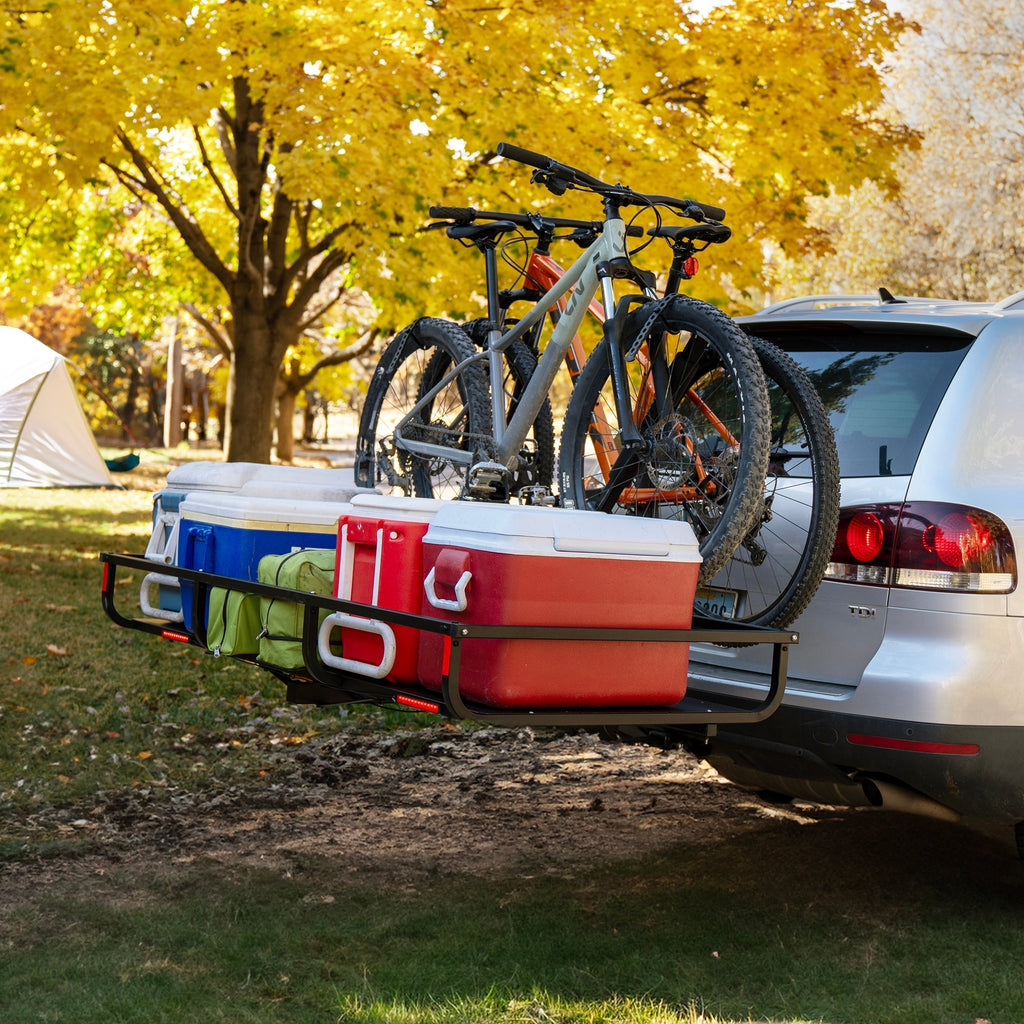Author: Amanda Kennedy
Published: April 25, 2025
Updated: April 25, 2025


Hitch cargo carriers provide an easy solution for adding extra storage space to your vehicle during road trips and daily errands. But are hitch cargo racks and carriers safe, reliable, and practical? In this article, we address common questions to help you confidently use this helpful vehicle accessory.
A hitch cargo carrier is an external storage platform or box that attaches directly to your vehicle’s hitch receiver. Available in various styles—open metal baskets, enclosed cargo boxes, or tray platforms—they’re a convenient way to carry additional cargo outside your vehicle. Most hitch carriers connect to a 2-inch (Class III) hitch receiver (though some lighter duty are available for 1.25in hitches) and keep your gear secure, stable, and easily accessible.

Yes, hitch carriers are safe when used properly. Designed to securely attach to your vehicle’s hitch, they provide stable storage behind your car. Their low positioning maintains a balanced center of gravity, significantly safer than rooftop carriers.
Here are some simple tips to ensure safe usage:
|
|
For the smoothest ride, upgrade to the Silent Hitch Pin. This simple yet powerful device eliminates annoying rattle and sway, keeping your hitch-mounted cargo stable and your drive quiet and secure. |
Proper use ensures that your hitch cargo carrier will securely and safely transport your gear wherever your travels take you.

Most hitch carriers support around 300 pounds of cargo, but how manufacturers report this capacity can vary. Some companies list the cargo weight rating or gear capacity, indicating exactly how much cargo the carrier can hold. Others use a gross weight rating, which includes both the cargo and the weight of the carrier itself. This gross rating can sometimes appear higher, giving the impression that the carrier can handle more weight than competitors when, in reality, the usable cargo capacity might be the same or even lower.
Always double-check if the rating provided is cargo-only storage capacity or gross weight, and subtract the carrier's own weight if needed, ensuring you don't overload.
Additionally, two important factors impact weight limits tongue weight and hitch class:
Yes—tongue weight, or the downward force exerted on your vehicle’s hitch, is critical. While your cargo carrier’s weight limit indicates how much the carrier itself can safely hold, the tongue weight limit defines the maximum load your vehicle's hitch can safely support. Even if the carrier is strong enough, your vehicle must also be rated to handle that total weight. Always verify your vehicle’s tongue weight rating in the owner’s manual or hitch documentation.

Exceeding your vehicle’s tongue weight limit negatively impacts handling, braking efficiency, and overall stability. It may cause suspension strain, hitch damage, or even dangerous loss of control. Always respect your hitch's rated capacities for safe travel.
Hitch classes determine receiver size and weight capacity:
Always select a cargo carrier compatible with your hitch class, ensuring both carrier and vehicle tongue weight limits are respected for safe hauling. For more information on hitch classes you can read our full run down here.

Generally, using hitch cargo carriers is legal. However, some important legal considerations apply:
Before traveling, confirm specific local or state regulations to remain compliant.

While platforms and baskets usually sit low enough to not block access, most standard hitch cargo boxes will restrict rear access if they don't have extra functionality. The box may physically block your trunk, hatch, or tailgate from opening completely. However, there are practical workarounds:
Evaluate how often you'll need rear access before choosing your carrier style or adapter.

Any additional cargo will slightly reduce your vehicle’s fuel efficiency. Fortunately, hitch cargo carriers sit behind your vehicle, minimizing wind resistance and aerodynamic drag compared to roof rack cargo solutions. The most noticeable impact on MPG comes from added weight rather than aerodynamic changes.
Typical mileage loss is minor (usually just 1-3 MPG lower). Keeping loads reasonable and removing the carrier when not needed helps maintain optimal gas mileage.

Hitch cargo carriers are extremely versatile options for adding extra space to your vehicle, suitable for numerous uses:
The possibilities are vast, limited only by carrier size, weight capacity, and your imagination!

Selecting the best hitch cargo carrier involves several considerations:
 |
Maximize your hauling potential with the GearDeck enclosed cargo carrier. Add the BikeBridge kit to securely transport bikes inside the weatherproof shell—keeping your gear protected, organized, and out of sight. |
A thoughtfully chosen cargo rack ensures reliability, convenience, and safety.

So, can you trust hitch cargo carriers? Absolutely. With appropriate selection, proper installation, secure loading, and adherence to weight limits and regulations, hitch cargo carriers become trusted companions for countless road adventures.
These carriers provide flexibility and convenience, from hauling camping gear or bikes to transporting work tools or generators. By understanding their practical limitations—like restricted trunk access or slight fuel efficiency impacts—and planning accordingly, you ensure a cargo carrier will enhance your vehicle’s functionality safely.
In short, when used wisely, a hitch cargo carrier is more than an accessory—it’s a reliable extension of your vehicle, making travel easier and stress-free.
|
Ready to upgrade your adventure setup? Let’s Go Aero offers a full lineup of innovative hitch cargo carriers—from enclosed boxes to open trays and slide-out systems—designed to fit your lifestyle and vehicle. Whether you're hauling bikes, camping gear, tools, or generators, we have solutions that maximize space, security, and convenience. Discover the right setup to make every trip smoother, safer, and more organized. |
|